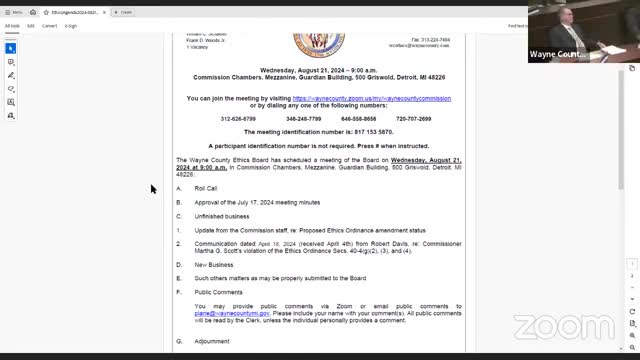Ethics Complaint Withdrawn Amid Controversial Hearing
August 22, 2024 | Wayne County, Michigan
This article was created by AI summarizing key points discussed. AI makes mistakes, so for full details and context, please refer to the video of the full meeting. Please report any errors so we can fix them. Report an error »

In a recent government meeting, a motion to dismiss a complaint against Commissioner Scott was discussed, culminating in the withdrawal of the complaint by the complainant, Mister Davis. The proceedings highlighted the complexities of the allegations, which included claims of harassment and misconduct.
Mister Ayed, representing Commissioner Scott, argued that the complaint lacked merit, emphasizing that all allegations had been addressed in written responses and previous hearings. He asserted that the complainant had failed to provide sufficient evidence to substantiate his claims, noting that the nature of a legislative aide's work often extends beyond traditional business hours, which was a key point in the defense.
Mister Davis, in response, acknowledged the challenges in proving his case due to the informal nature of the proceedings and the ongoing litigation that limited the testimony of Commissioner Scott. Ultimately, he moved to withdraw the complaint, stating that without the necessary testimony, he could not meet the burden of proof required.
The board members engaged in a discussion regarding the implications of the withdrawal, particularly whether it should be with or without prejudice. Mister Longstreet, the board's counsel, clarified that while there is no explicit provision for dismissal with prejudice in their ethics code, the board has the authority to dismiss future complaints on similar grounds if they are deemed to lack sufficient evidence.
After deliberation, the board unanimously agreed to grant the motion to dismiss the complaint, recognizing the lack of evidence presented. The meeting concluded with an invitation from Dawn Widman, a senior investigator from the Detroit Board of Ethics, to a regional conference aimed at enhancing the effectiveness of local ethics boards, emphasizing the importance of ongoing education and collaboration in governance.
Mister Ayed, representing Commissioner Scott, argued that the complaint lacked merit, emphasizing that all allegations had been addressed in written responses and previous hearings. He asserted that the complainant had failed to provide sufficient evidence to substantiate his claims, noting that the nature of a legislative aide's work often extends beyond traditional business hours, which was a key point in the defense.
Mister Davis, in response, acknowledged the challenges in proving his case due to the informal nature of the proceedings and the ongoing litigation that limited the testimony of Commissioner Scott. Ultimately, he moved to withdraw the complaint, stating that without the necessary testimony, he could not meet the burden of proof required.
The board members engaged in a discussion regarding the implications of the withdrawal, particularly whether it should be with or without prejudice. Mister Longstreet, the board's counsel, clarified that while there is no explicit provision for dismissal with prejudice in their ethics code, the board has the authority to dismiss future complaints on similar grounds if they are deemed to lack sufficient evidence.
After deliberation, the board unanimously agreed to grant the motion to dismiss the complaint, recognizing the lack of evidence presented. The meeting concluded with an invitation from Dawn Widman, a senior investigator from the Detroit Board of Ethics, to a regional conference aimed at enhancing the effectiveness of local ethics boards, emphasizing the importance of ongoing education and collaboration in governance.
View the Full Meeting & All Its Details
This article offers just a summary. Unlock complete video, transcripts, and insights as a Founder Member.
✓
Watch full, unedited meeting videos
✓
Search every word spoken in unlimited transcripts
✓
AI summaries & real-time alerts (all government levels)
✓
Permanent access to expanding government content
30-day money-back guarantee

